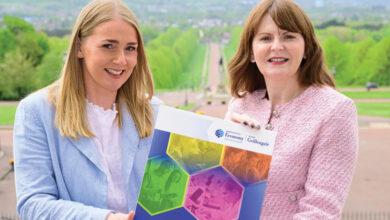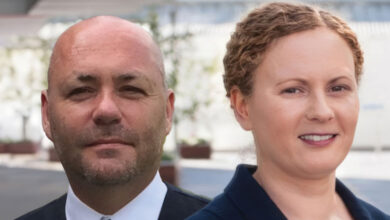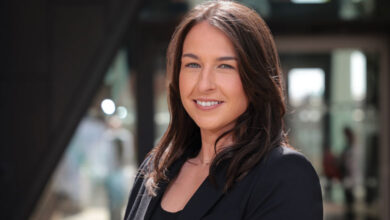Science and foresight
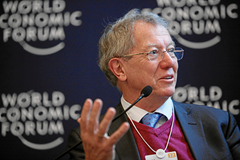 Sir David King explains how to take the long view in policy and the need to think outside the box in industry, transport and energy. The UK’s former Chief Scientist talks to Peter Cheney.
Sir David King explains how to take the long view in policy and the need to think outside the box in industry, transport and energy. The UK’s former Chief Scientist talks to Peter Cheney.
“If you’re simply concerned with what the newspapers will say tomorrow and what the electorate will do in a few years’ time, you’re never going to get the policies right,” says Sir David King as he calls on government and industry to take the long view.
A softly spoken South African, King was the UK Government’s Chief Scientist between 2000 and 2008 and developed the foresight process, which has identified long-term scenarios for obesity, climate change, agriculture and mental health.
He is speaking to agendaNi just before taking the Bernard Crossland lecture at Queen’s University on how innovative manufacturing can meet new 21st century challenges.
King wants ministers to look at problems, ask “Where will we be in 50 years’ time?” and then seek advice on what decisions they must take to “put the country in the best possible position in 50 years’ time.”
An inter-disciplinary team of 100-200 people works on a foresight programme over a two-to-three year period. The obesity programme, which reported in 2007, “had more impact and still has across the United Kingdom than almost anything else we did.”
That report concluded that obese children will find it very difficult to change their habits as they get older. The business-as-usual scenario warned of an “obesity epidemic” with at least 50 per cent of the population being clinically obese.
No single policy lever (e.g. better diet or more exercise) appeared to deliver real change. A whole culture change was needed with every government department playing its part.
King regrets that the Government did not use the foresight process before its military interventions in Afghanistan and Iraq, as it would have presented both the most optimistic and the most pessimistic scenarios.
Separately, he pioneered the introduction of chief scientific advisers across government. These are now in place in 14 Whitehall departments, four major government agencies, and the Scottish and Welsh governments.
As yet, Northern Ireland does not have a single chief scientific adviser but Professor Bernadette Hannigan and Dr Sinclair Mayne are the joint interim advisers. Hannigan and Mayne advise on health and agriculture respectively.
Tony Blair asked King to roll out the practice throughout government after the 2001 foot-and-mouth crisis. The initial response was based on the 1967 outbreak, which was wind-borne, but King’s staff found that the 2001 incidents were very localised with the virus spreading from herd to herd. Animals in neighbouring farms were culled and the outbreak was brought under control.
“There’s no doubt in my mind, you can govern without good scientific advice but I don’t think you can govern well without good scientific advice,” King remarks.
At a global level, he emphasises that the economy must become circular (i.e. recovering and recycling as many resources as possible) to cope with rising demographic pressure.
The world’s population has risen from 1.5 billion in 1900 to 7 billion today, and may reach 9 billion by 2050. The number of middle class consumers stood at 1 billion in 2000, is now 2 billion and could reach 4.8 billion by 2030.
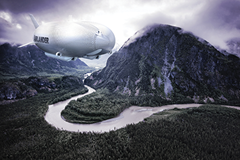 Consumption at 20th century rates will cause shortages in every sector, including food and fresh water. Commodity prices have experienced a three-fold increase in the last seven years, driven by rapid, continuing growth in middle class demand.
Consumption at 20th century rates will cause shortages in every sector, including food and fresh water. Commodity prices have experienced a three-fold increase in the last seven years, driven by rapid, continuing growth in middle class demand.
“This is now stalling the western economies,” King states. “Now, the way forward is lean, green manufacturing.” King believes that “almost all” manufacturing can make that change and points to Gordon Murray Design’s cars, which are mostly made from recyclable plastic parts.
New thinking is needed to cut food wastage between the field and the table and capture the minerals in sewage, which currently end up in the sea after treatment but could be used in fertilisers. The Questor centre at Queen’s is involved in the research into sewage recovery.
For its part, the UK stores a large volume of spent uranium and 105 tonnes of plutonium in Cumbria. He suggests: “If we re-process the uranium and if we make mixed oxide between the plutonium and the uranium, we can go on producing electricity for the UK for many, many years ahead without importing another gram of uranium.”
King thinks that these resources could provide up to 500 years of energy. The mixed oxide would be fed into a purpose-built reactor.
The alternative is to continue storing plutonium as heavily guarded waste, as it provides fissile material for nuclear weapons. The oxide, though, would no longer be fissile and the revenue could help to cover the costs of reprocessing.
“We must always focus on thinking out of the box. What are the alternatives? How do we manage these short supplies?” He surmises: “If you’re into wealth creation nowadays, it’s a wonderful opportunity. If you’re a young scientist, engineer, technologist, medic going out into the world, once again this is a very exciting challenge.”
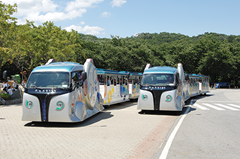 Changing direction in transport
Changing direction in transport
Over the last five years, David King has spent more time on transport policy than any other issue. This stands out as the greatest challenge due to transport’s heavy dependence on petrol and kerosene but a “tremendous” number of alternatives are emerging.
The online electric vehicle (OLEV) system being trialled in Seoul, South Korea, uses inductive coils in the road which delivers electricity when it makes contact with the secondary coil in the car. Its small battery charges as soon as it goes online.
Passengers lost confidence in airships after the 1937 Hindenburg disaster (a hydrogen fire) but Hybrid Air Vehicles, based in Bedfordshire, is now developing large airships which use non-flammable helium for lift. Its Airlander craft will carry 40 passengers and six containers, and be powered by four fully rotatable engines. Cargo can therefore be delivered “directly from the air” and transported directly from the producer to the retailer, rather than via an airport.

